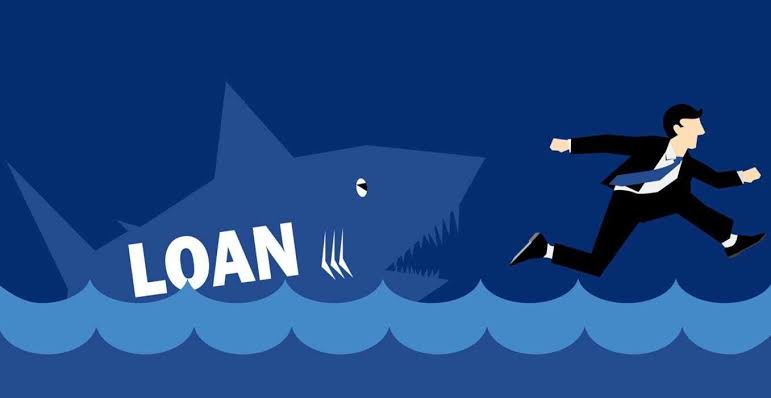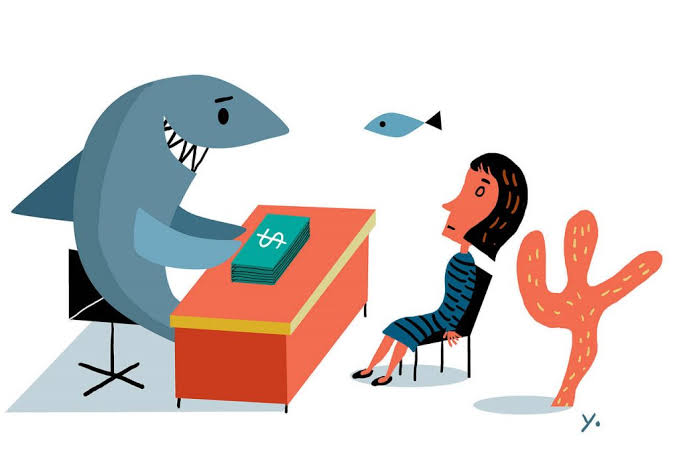Physical Address
60 Ekwema Cres, Layout 460281, Imo
Physical Address
60 Ekwema Cres, Layout 460281, Imo

If you’ve ever borrowed money from a loan shark in Nigeria, you understand the misery caused by these unprofessional lenders.
Loan sharks, whether digital platforms or offline lenders, offer loans at high interest rates and employ aggressive collection tactics like sending threatening messages to you and your contacts. Operating without a license, they resort to illegal means such as threats of violence and blackmail for repayment.
A loan shark is an individual who lends money at exorbitant or illegal interest rates, imposes strict collection terms, and typically operates outside the boundaries of the law.
They often resort to threats of violence or other illegal and aggressive tactics to ensure debt repayment. Loansharking, as a continuous illegal business practice or “racket,” is commonly linked with organized crime and specific criminal groups.

Loan sharks, as the above paragraph defines, derive their name from real-life sharks for their aggressive and greedy nature, preying on financially vulnerable individuals like smaller fish.
Despite their notorious behavior, some people still use them due to the allure of quick cash without collateral, especially given Nigeria’s economic challenges.
In this article, we explore popular Nigerian loan sharks, provide tips to identify them, and suggest measures to avoid falling prey to their tactics.
Also read: Full List of Genuine Loan Apps in Kenya
The rise of loan apps in Nigeria has changed the borrowing landscape. While these apps initially seem like a convenient solution by offering collateral-free loans, the reality is quite different. Loan sharks, disguised as legitimate apps, flood digital spaces, promising quick access to funds for emergencies but end up exploiting vulnerable Nigerians.
These faceless apps deceive people into borrowing, only to swindle them of their hard-earned money. Many borrowers have shared their harrowing experiences online, highlighting the deceptive practices of these platforms. Some popular loan sharks in Nigeria include SokoLoan, Kashkash, LCredit, 9Credit, iCredit, OKash, GoCash, and more. If you’re unfamiliar with these apps, consider yourself among the elite few in Nigeria.
Also read: SASSA Loan: how to Apply and Access it
Spotting loan sharks among legal moneylenders requires vigilance since they won’t openly disclose their true nature. Without proper research, falling victim to them is easy, leading to regretful statements like “I didn’t know they were loan sharks.” However, with the following pointers, you can distinguish these predatory lenders from legitimate ones:
To avoid falling into their traps, check the reviews of loan apps on Google Play Store or Apple App Store. Negative experiences shared by users can serve as warning signs of potential loan sharks.
Also read: Kaelo Money Loan: how to Apply and Get it
If you haven’t already received the memo, I strongly advise against borrowing money from loan apps. We’ve already discussed ways to identify and steer clear of Nigerian loan sharks. While you may have reasons to consider borrowing from such apps, the drawbacks far outweigh the benefits. Let’s delve deeper into these reasons:
Loan apps charge exorbitant interest rates, ranging from 20% to 35% weekly or monthly, compared to commercial banks’ rates of 9% to 11.13% annually. For loans with reasonable rates, consider reputable institutions like Carbon.
Sharing your BVN details with loan apps, driven by desperation for quick funds, can lead to severe consequences. Unauthorized use of your BVN for fraudulent activities or blacklisting by credit bureaus due to payment defaults can hinder future loan access for significant transactions.
Loan sharks resort to unprofessional, unethical, and illegal tactics such as defamation, harassment, and intimidation to recover debts. Defaulting can result in humiliating messages sent to your contacts, damaging your reputation and causing immense stress.
The easy accessibility of loans from sharks can lead to a borrowing cycle, where one loan is used to repay another. This dependency can spiral into financial ruin, affecting your integrity, self-esteem, and overall well-being.
In conclusion, avoid borrowing from loan apps. Their predatory practices, high interest rates, harassment tactics, and potential misuse of your personal information make them a risky choice. The government and financial institutions strongly advise against such loans, with regulatory bodies actively working to curb their operations in Nigeria.
While you may have legitimate needs for a loan, turning to loan sharks is akin to jumping from the frying pan into the fire. The risks far outweigh the benefits, as discussed in our exploration of Nigerian loan sharks.
Also read: Kuda Bank Loan: Application, Qualifications and Requirements
Q: What are loan sharks in Nigeria?
A: Loan sharks in Nigeria refer to unlicensed lenders, often digital platforms or offline entities, that offer loans at exorbitant interest rates and employ aggressive collection tactics.
Q: How can I spot a loan shark among legal lenders?
A: Look out for red flags such as high interest rates, requests for BVN access, faceless operations without verified owners or physical addresses, and unprofessional harassment tactics.
Q: Why should I avoid borrowing from loan sharks?
A: Borrowing from loan sharks can lead to financial distress due to high interest rates, privacy concerns with BVN sharing, harassment tactics, and potential addiction to borrowing.
Q: What are the risks of borrowing from loan apps in Nigeria?
A: Risks include excessive interest rates, potential misuse of personal information like BVN, harassment and intimidation tactics upon default, and the likelihood of falling into a borrowing cycle.
Q: How can I protect myself from loan sharks?
A: Protect yourself by conducting thorough research before borrowing, avoiding sharing sensitive information like BVN, checking app reviews, and seeking loans from reputable institutions.
Q: What actions are being taken against loan sharks in Nigeria?
A: Regulatory bodies like the Federal Competition and Consumer Protection Commission (FCCPC) are actively working to freeze the operations of unauthorized loan apps in Nigeria to protect consumers from predatory lending practices.
In conclusion, navigating the landscape of borrowing in Nigeria requires careful consideration and awareness of the risks involved, particularly when dealing with loan sharks. These predatory lenders, disguised as legitimate loan apps, pose significant threats to financial well-being, privacy, and overall peace of mind.
It’s crucial to prioritize borrowing from reputable institutions that offer transparent terms, reasonable interest rates, and ethical lending practices. By avoiding loan sharks and making informed financial decisions, individuals can safeguard themselves from potential financial distress and ensure a secure borrowing experience.
Remember, the government and regulatory bodies are actively working to curb the operations of unauthorized loan apps, emphasizing the importance of consumer protection and fair lending practices. Stay vigilant, do your research, and choose wisely to navigate the borrowing landscape with confidence and security.
Also read: Banks that Give Loan Easily in Kenya
Interact with us via our social media platforms:
Facebook: Silicon Africa
Instagram: Siliconafricatech
Twitter: @siliconafritech